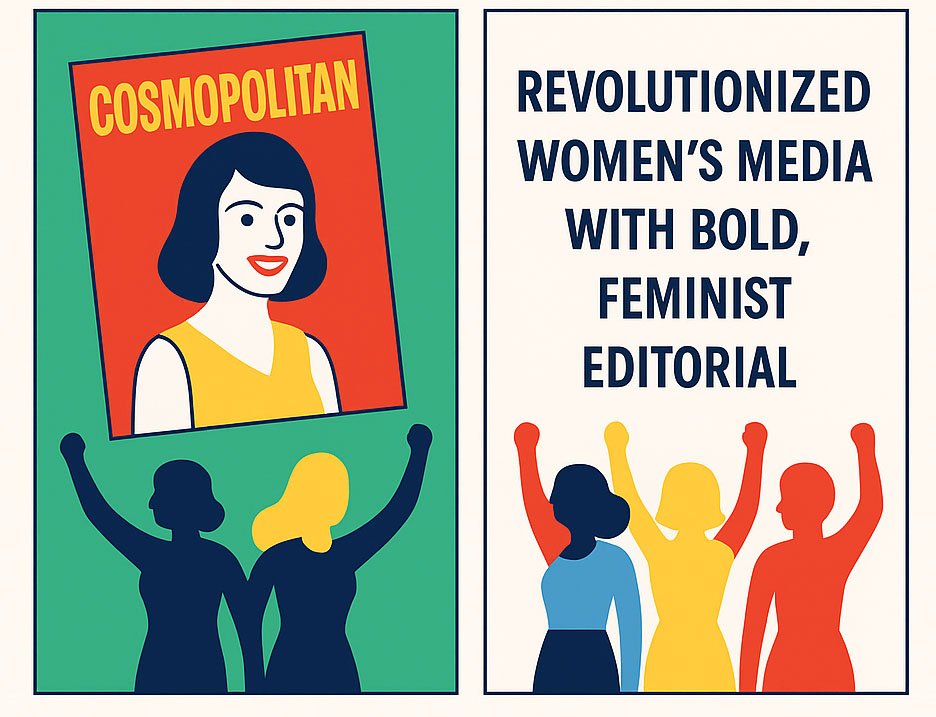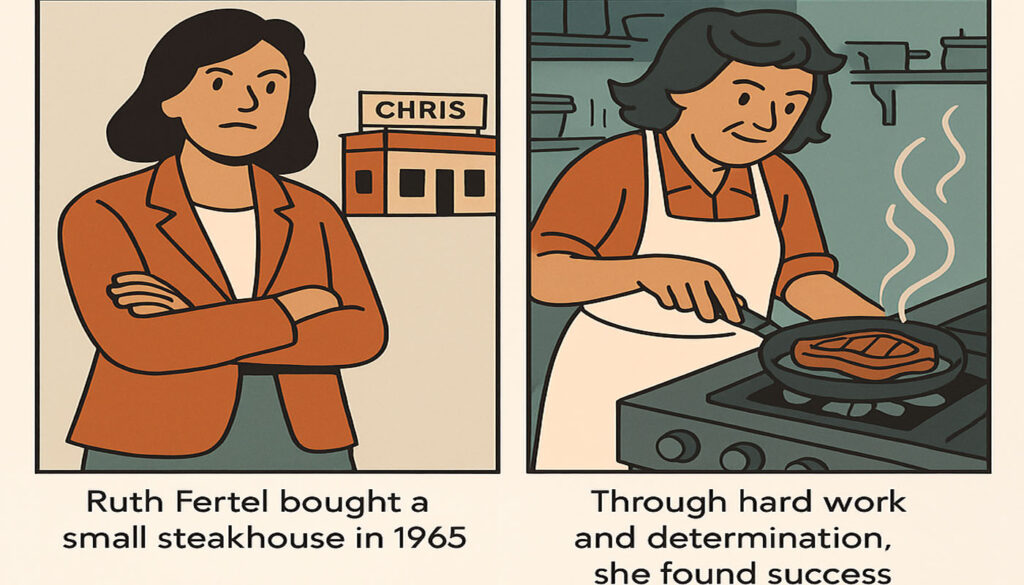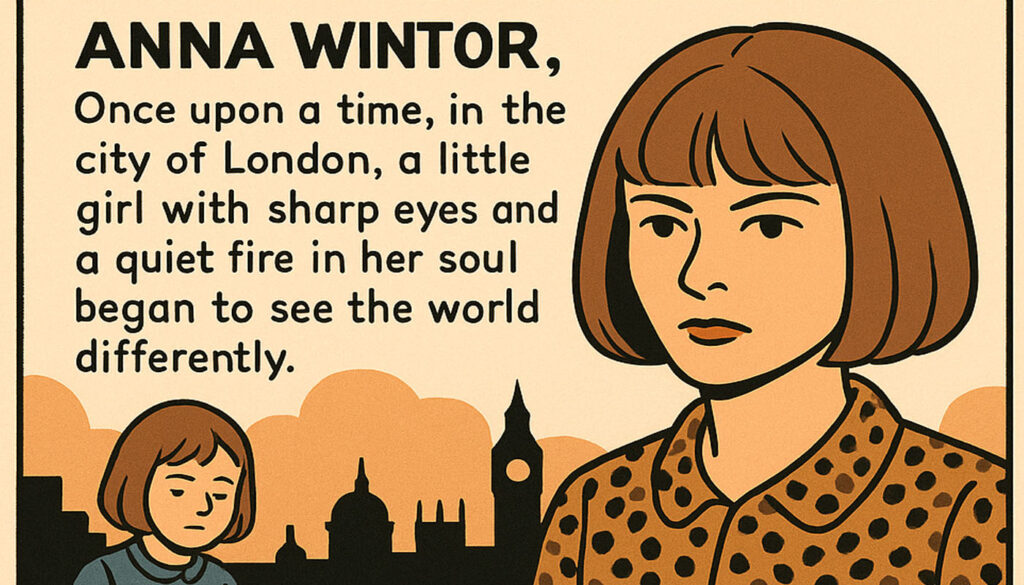Helen Gurley Brown was not born into power or privilege. She didn’t have a silver spoon, nor did she have a famous last name. What she had was grit, bold ideas, and an unstoppable spirit. She became the editor-in-chief of Cosmopolitan magazine in 1965 and turned it into a powerful voice for women. Her journey wasn’t easy, but that’s what made her success all the more inspiring.
Helen was born in 1922 in Arkansas, a time when girls were often told to stay quiet, stay pretty, and wait for a husband. But Helen never believed in staying quiet. She had dreams bigger than the little town she grew up in. After her father passed away in a tragic elevator accident when she was just ten, Helen’s mother moved the family to Los Angeles. Life was tough. They didn’t have money, and Helen had to work hard just to keep up with school and life. But even as a young girl, she had a sparkle—a sharp mind and a curious heart.
She didn’t go to an Ivy League school. In fact, she took secretarial classes because that was one of the few jobs women could easily get back then. She learned typing, shorthand, and how to organize offices. But she didn’t stop there. She entered the workforce, not just to earn a paycheck, but to understand how things worked—from the inside. She worked as a secretary for advertising agencies, but she didn’t just type letters—she paid attention. She listened. She learned.
In a world dominated by men, Helen found her power in words. She started writing copy—sharp, catchy, funny, smart. And it wasn’t long before her talent was noticed. She became one of the highest-paid female copywriters in the country. Her life took a turn when she decided to write a book. A bold, cheeky, and scandalous book for its time—Sex and the Single Girl.
The book exploded like a firework across America. In the early 1960s, women were expected to marry young, settle down, and live quietly. Helen’s book told them something wildly different: You don’t need a man to have a life. You don’t need marriage to be happy. You can work, you can have fun, you can live boldly on your own terms.
Publishers were shocked. Critics were stunned. But women? Women were listening. They were hungry for her words. Her book sold millions and became a symbol of a new kind of woman: independent, smart, sexy, and unashamed.
That book changed everything—not just for Helen, but for women across the country. And then came the big opportunity. Cosmopolitan, a fading magazine with a long history but no real identity, needed saving. In 1965, Helen Gurley Brown was offered the editor-in-chief job. Most people thought it was a mistake to hire her. She had no experience in running a magazine. She was too bold, too flashy, too female. But Helen had a vision.
She wanted to create a magazine for the woman who didn’t want to be told what to do. A magazine that spoke about fashion, yes—but also about ambition, love, money, careers, friendships, and yes—sex. She brought her signature sass, humor, and boldness to every page. Under her leadership, Cosmopolitan was reborn.
The magazine had glossy covers, glamorous models, and clever headlines. But more than that, it had heart. It talked to women the way no magazine had dared to before. Helen put stories in that told women they could be anything they wanted: a boss, a lover, a dreamer, a doer. She celebrated women who worked hard and played hard. She made the word “Cosmo girl” a symbol of confidence.
Of course, not everyone loved what she did. Critics said she was too focused on looks or relationships. But Helen didn’t back down. She believed women could love lipstick and leadership. She believed ambition and attraction could live on the same page. And her readers agreed. Under her leadership, Cosmopolitan‘s sales skyrocketed.
But Helen wasn’t just about headlines and glossy spreads. She pushed the limits inside the publishing house, too. She hired women, promoted women, mentored them. She brought female voices into the rooms where decisions were made. She didn’t just tell women to be bold—she showed them how. She led with style and strength, and her team admired her deeply.
What made Helen unique wasn’t just her confidence, but her honesty. She admitted to feeling insecure. She talked about being a late bloomer. She said she didn’t feel beautiful growing up—but that didn’t stop her from making herself powerful. Her honesty was a gift to readers. It made her relatable. Women trusted her because she wasn’t pretending to be perfect. She was real.
Her reign at Cosmopolitan lasted over three decades—from 1965 to 1997. She didn’t just keep the magazine alive; she made it iconic. And she wasn’t done yet. Even after stepping down as editor-in-chief, she stayed on as editor of Cosmo‘s international editions, helping launch versions of the magazine in over 50 countries.

Helen Gurley Brown became more than just a magazine editor. She became a symbol of modern womanhood. She was proof that bold ideas, paired with hard work and heart, could change the world. She never told women to settle—she told them to strive, to sparkle, to stand tall.
She built an empire of empowerment long before hashtags and hashtags movements. She did it with paper, ink, and truth. She challenged the old stories about women and wrote new ones—stories filled with laughter, passion, ambition, and freedom.
When she passed away in 2012, tributes poured in. Women around the world remembered her as the voice that told them they mattered, that their lives were their own to shape. Even today, her influence is felt in every bold headline, every fearless female voice in media, every woman who chooses to chase dreams unapologetically.
Helen Gurley Brown may have started as a secretary, but she ended up rewriting the rules of the publishing world. She took a fading magazine and turned it into a global icon. She took outdated ideas and replaced them with fire.
She once said, “Don’t use men to get what you want in life. Get it yourself.” And that’s exactly what she did.
She was a woman ahead of her time, with a typewriter in her hands and courage in her heart. She wasn’t afraid to shake the world—and because of that, the world will never forget her.

















